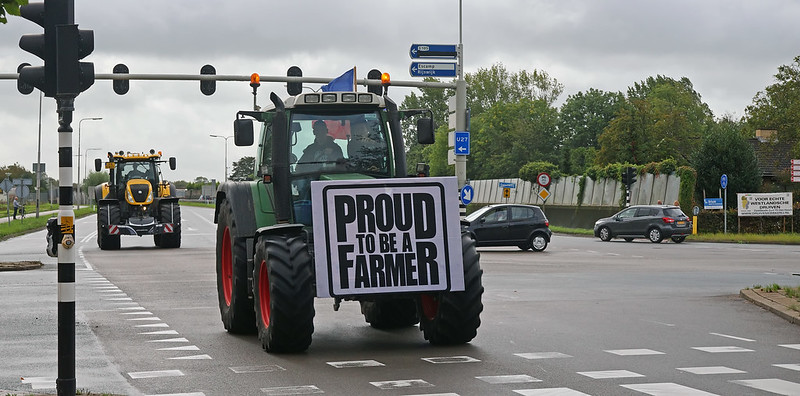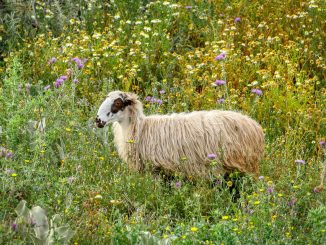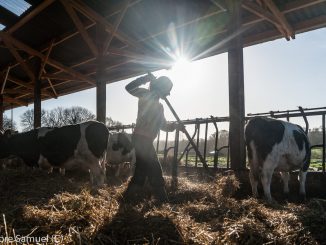
Big corporations, with a vested interest in an export-orientated, highly intensive model of farming, have given financial support to the Boeren Protests that have swept the Netherlands. However this intensive model is coming under increasing criticism from farmers who are being asked to do an array of sometimes contradictory things. Disparate groups are coming together to offer ways out of this impasse. Part 2 from Hans Wetzels.
Hans Geurts runs a dairy farm in the small town of Veulen in the southern Dutch province of Limburg. The town has about 500 inhabitants and is located in the middle of the infamous Peel: a peat moor area near the Dutch-German border.
Since 2009 Geurts is the chairman of the Dutch Dairy holders Union (NMV – Nederlandse Melkveehouders Vakbond) and a vocal critic of the way the government handles the nitrogen crisis that sent Dutch farmers into a frenzy in October 2019.
‘If policymakers truly want a sustainable agricultural system, coalition parties should withdraw their support for trade agreements with countries such as Canada and Brazil that would force farmers to produce for unacceptably low prices,’ he writes in an opinion piece co-authored by the Dutch branch of Friends of the Earth in the Dutch national newspaper Trouw.
On 29 May 2019 the Dutch administrative high-court (Raad van State) ruled that the government system granting nitrogen emission to farms and the construction industry permits was in breach of EU-rules. To prevent thousands of construction projects coming to a grinding halt, the government proposes to revoke farm emissions rights and to drastically reduce the Dutch livestock population. What ensued in the small country at the North Sea shore is an unprecedented wave of protests, with farmers blocking roads, ramming into assembly halls and even a death-threat directed at the leader of the green party GroenLinks.
Below is part one of this two part series
World Markets and an Array of Asks
Since 2000 a third of all farms in the Netherlands had to close shop because of decreasing farm incomes, foreign competition, all-powerful traders and an increasing amount of environmental regulations. Withdrawing nitrogen emission rights now could mean a final push over the edge for a lot of Dutch farms – especially when at the same time asking farmers to reduce their environmental impact, be competitive on the world market, and export high-quality meat and dairy.
Geurts: ‘Many farmers are trapped between increasing societal pressure for a clean environment, animal welfare and food safety, and a world market that only provides them with the lowest price possible. When we, as a society, are confronted with the negative consequences of that, we punish farmers with stricter rules without changing the game.’
The current crisis in the Netherlands might even develop in a broader EU-problem. According to the European Environment Agency Ammonia emissions all over Europe have been on the rise for years. Among the EU-28 the Netherlands, Spain, Austria, Croatia, Ireland and Germany repeatedly reported emissions exceeding their ceilings.
“The Netherlands is only a small country,” Trieke Elshof of the Dutch agricultural organization LTO (Land- en Tuinbouworganisatie) explains. “What we’ve seen over the last month is a result of piling up of frustration among farmers who’re blamed for every wrong in the environment. They are confronted with more environmental demands, but they’re not earning more money and agricultural policies are completely unreliable and changing every year.”
A Different Model
Elshof lives in the northern province of Friesland herself. Seventy percent of all employment in that region is related to agriculture, she says. LTO thus represents a lot of people in the Dutch countryside directly and indirectly and has been the traditional lobby organization for the farming sector. But there are other forces emerging that are not at all satisfied with the model of export-oriented, extremely efficient and intensive agriculture LTO has been proposing for years on end.
More and more Dutch farmers would like to step away from evermore intensive livestock farming. To make a structural shift like that possible, dairy farmers’ union NMV and several allied organizations have proposed several policy alternatives.
The alliance is wide and interesting. It is further consisting of the Dutch Dairymen Board, agricultural union NAV (Nederlandse Akkerbouw Vakbond), the Dutch poultry union NVP (Nederlandse Vakbond Pluimveehouders), Platform Earth-Farmer-Consumer, the Dutch branch of Friends of the Earth and the political party of GroenLinks).
The alliance proposes to limit the power of banks and supermarkets over farmers to be able to better guarantee farm incomes, measures against land speculation, subsidizing protein crops and legumes that fixate nitrogen in the soil and the strengthening of local markets against imports of cheap soy and palm oil, and the implementation of quota to control production levels. In other words, a different, more farmer-orientated and environmentally considered approach to agri-food.
‘Politicians talk a lot about fair prices for farmers,’ Geurts stated on national television. ‘But trade agreements such as CETA set up farmers against each other, disrupt markers and lead to unfair competition. Fair prices and too much free trade contradict each other.’
Vested Interests Sponsoring Protests
LTO itself remains positive about trade agreements and underlines the importance of export for Dutch farmers – who’d have to shrink in size by two-thirds if export would decrease substantially.
However, the current nitrogen crisis has also prompted the powerful LTO to open its eyes to the fact something has to change, Elshof admits: “Looking at the amount of anger among our members, we’re starting to realize farmers aren’t all that satisfied with the policies we have been advocating in the past. I don’t know too much about trade policies myself. But I do know farmers have to be put in a context that allows them to operate in a more sustainable way and we need sound policy to back that up.”
Research from Dutch news network RTL Z has shown the October protests received substantial financial support from big corporates, such as feed producer De Heus, meat producer Vion and ForFarmers – a listed feed cooperation with a yearly turnover of 2,4 billion euro’s and foreign production facilities in Germany, Poland and the United Kingdom. Current Dutch policy proposals to deal with the nitrogen crisis, primarily the shrinking of the amount of livestock, would directly hit their business interests.
Another Proposal
On November 20 a newly formed collective consisting of big organizations such as LTO, the action group Farmers Defence Force, but also smaller groups such as the Dutch Dairymen Board, NAV, NMV and NVP has released an extensive proposal with measures to deal the nitrogen crisis. The report is authored under auspices of former chairman of the board of Wageningen University Aalt Dijkhuizen and proposes to take several measures such as stimulation of grazing, lessening protein levels in feeds, less reliance on imports or better usage of animal manure instead of artificial fertilizers to close the loop on the farm.
The protests sweeping through the Netherlands might have been an important signal for all actors in the Dutch agricultural sector to close ranks, forest manager Wanne Roetemeijer stresses. But farmers aiming their anger at environmentalists or green parties might be misdirected. “Farmers are angry about new rules and restrictions imposed on them all the time. But they’d better redirect their anger at the political establishment failing to take action against a nitrogen crisis that has been in the making for twenty years. It wasn’t the green movement that pushed onto the world market, and into evermore intensive farming, only to be able to compete with foreign farms and powerful supermarkets. Years on end governments didn’t set any production limits and created the incentives to produce more and more. That policy now shows it has environmental consequences,” Roetemeijer explains.
“If we want to shift into a more environmentally friendly agricultural system we will have to start now. It could take decades until nitrogen surpluses are fully gone from the Dutch ecosystem. But without sound policies structurally bringing down emissions, while at the same time providing farmers with decent incomes, we won’t be able to realize that shift.”






